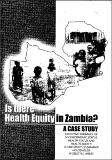Is There Health Equity in Zambia? A Case Study

View/
Date
2003-03Authors
Mwikisa, Chris N
Seshamani, Venkatesh
Type
Research PaperLanguage
enItem Usage Stats
60
views
views
35
downloads
downloads
Abstract
Zambia has for a long time been experiencing high levels of poverty and inequality. This has been manifested in a number of ways, health poverty and inequality being one of them. The cause of worsening poverty in Zambia has been clearly outlined by the government in its poverty reduction paper, PRSP. Over the year years the country has at best experienced marginal economic growth.With a population growth rate of almost 3% per year, the population has more than tripled over the last 40 years. While economic growth has been marginal, successive governments have failed to follow pro - poor strategies together with unfavourable land ownership laws and unsupportive land tenure systems as well as the fact that most of the population lead a subsistence existence without access to credit facilities has led to continuous decline in productivity. Above all due to poor governance, lack of transparency and accountability, drought, unfavourable international market relations and a huge debt burden, well over 73% of the population has been living below the poverty datum line. the situation has been compounded by the HIV/AIDS epidemic that has been impeding human capital formation necessary for sustainable growth.
Description
If Zambia is ever to turn the corner on development - that is, move away from severe poverty conditions and advance towards sustainable livelihoods for all - there must be a marked improvement in the delivery of education and health services. No country develops without an educated and health population. Sometimes this fact is referred to as the human capital resource basis for a well- ordered society based on justice. Because we at Jesuit Centre for Theological Reflections (JCTR) believe in the basic human rights of every citizen for good education and good health care, we have done research, education and advocacy programmes touching on these topics. Our monthly Basic Needs Basket highlights the average cost of living for families, contrasting with the take - home pay from average salaries. The findings of this survey show that very little money is available to meet family need s for education and health.